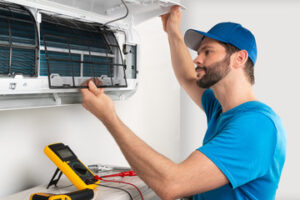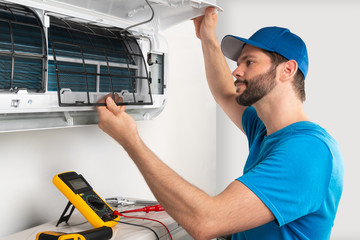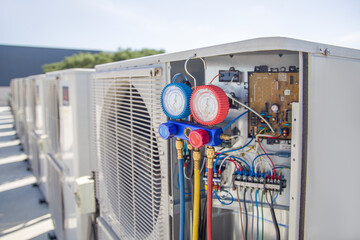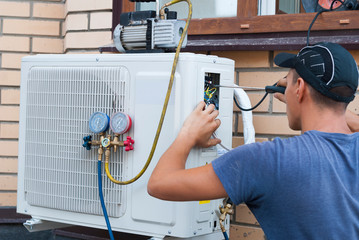HVAC Round Rock is an abbreviation of heating, ventilation and air conditioning. Its primary function is to create a comfortable and healthy environment in residential, commercial and industrial buildings.

Conditioned air flows through duct pipes to supply vents (or registers) in individual rooms. Airflow is assisted by take-offs, turning vanes, cleats and metal butt connectors that create pathways to efficiently channel cool or warm air throughout the building.
Brand trust is the bedrock that supports repeat business, spurs organic referrals and nurtures positive perceptions about your HVAC company. It’s essential to your success because a loyal customer base provides steady revenue and acts as an effective marketing resource for the rest of your community. This can be achieved by delivering excellent service, providing competitive pricing and maintaining a strong presence in your local area.
Whether you’re new to the HVAC industry or have been serving residential and commercial clients for years, your branding strategy is an important part of your reputation. It’s crucial to build a brand that invokes an emotional response in your audience, making them feel connected and confident in your services. Effective branding includes a unique selling proposition (USP) that highlights the value you bring to your customers, testimonials and social media content that showcases your professionalism and reliability.
To determine the 2024 America’s Most Trusted HVAC System brands, Lifestory Research surveyed people who were actively shopping for an HVAC system. These shoppers were asked to rate their experiences with various brand features, their confidence in the brand and how likely they would be to recommend the brand to others. The brands with the highest ratings for each of these factors were ranked nationally.
Trane was the top-ranked HVAC brand in the 2024 America’s Most Trusted study, followed by Carrier and Whirlpool. Trane is a unit of Ingersoll Rand and has been building HVAC systems for over 100 years. Its systems are tested to withstand the harshest environmental conditions.
The top-ranked brands in the 2024 America’s Most Trusted survey were rated for their quality, dependability and value for the money. In addition to high-quality products and exceptional service, these brands were also praised for their honesty, integrity and ease of communication. They are recognized for creating long-lasting relationships with their customers and helping them to create comfortable, healthy homes. For more information about the 2024 America’s Most Trusted brand study, visit Lifestory Research. The research is based on responses from more than 12,000 consumers who were actively shopping for an HVAC system in the United States.
Reputation
The reputation of an HVAC business is a big factor in how many new customers it will attract. A great reputation will increase brand trust, help the company get a good ranking on search engine results pages (SERPs), and encourage more customers to choose the company over competitors.
A strong online reputation is vital to the success of any HVAC business, and it can be difficult to achieve without a solid strategy. However, it is not enough to simply monitor and respond to reviews on a regular basis. A successful reputation management strategy must be proactive and include multiple marketing tactics.
One of the best ways to build a positive reputation for an HVAC company is to encourage satisfied customers to share their experiences with others. Make it easy for them to do so by giving them a link via email or text message after each service call, and making the process as simple as possible. This will increase the chances of getting more five-star reviews, and it will also show potential customers that you care about your reputation.
In addition to encouraging customers to leave reviews, it is important to be active on social media and to post content about your company. For example, you can create videos featuring customer testimonials, and this can be used as social proof and a marketing tool. Moreover, it will show that you are a professional and trustworthy HVAC company.
Another way to boost your online reputation is by optimizing your online profiles and listings. Ensure that all your contact information is correct, and add photos and details about your business. You should also regularly update your profile and add new reviews. Finally, it is a good idea to join and participate in local directories, as this will help your HVAC company gain visibility in search engine results.
Many HVAC companies don’t pay attention to their reputation until they receive a bad review or other crisis. However, it is important to manage your reputation on a daily basis, and this can be done with a reputation management software tool such as ServiceTitan. The software can track customer reviews and other brand mentions, and notify you when something new is published. It can also automate responses to positive and negative feedback, so you don’t have to worry about forgetting to do it.
Warranty
When choosing an HVAC system, it’s important to understand the warranty that is included with the equipment. A manufacturer’s warranty typically covers parts and components while a labor warranty addresses the cost of repairs. A company like Viviano offers a 10-year labor warranty on all qualifying systems, which is an excellent way to protect the investment in your new system.
It is important to note that most manufacturers’ warranties do not cover any of the labor required to service the system. Labor warranties are typically covered by the installation company or third-party insurers associated with them, and are a great way to ensure that you don’t get hit with unexpected costs when the time comes for your system to be repaired.
The good news is that many installation companies also offer their own separate labor warranties in addition to the manufacturer’s part warranty, and these are generally quite comprehensive. They may even include a no-deductible, which is a fantastic peace of mind feature that can significantly lower your repair bills and ease the stress of dealing with the equipment when it breaks down.
Unfortunately, most warranties do have some exclusions in place that will prevent certain parts and components from being covered by the manufacturer. It is important to note that normal wear and tear, physical destruction, so-called “acts of god,” and electrical surges are typically excluded from most warranties.
Additionally, if you are not able to provide proof that you have maintained your system according to the documentation provided by the manufacturer, most manufacturers’ warranties will become void. Getting your system regularly inspected and serviced by a licensed and certified technician will ensure that the warranty stays in place and that you are protected from out-of-pocket expenses should the need arise for a replacement part.
Another thing to consider is that most warranties are not transferable when a home changes ownership. This can be an important consideration if you are looking to buy a home with an existing system, or if the current homeowner has already registered their equipment and part warranty with the manufacturer.
Preventive Maintenance
Aside from reducing the risk of HVAC breakdowns, preventive maintenance will also improve your building’s performance and cut down on energy bills. A well-maintained system will run smoothly, so it won’t need to work as hard to keep the indoor temperature comfortable. This will save you money on energy costs, as well as help to reduce the amount of pollutants and other harmful chemicals that are being circulated throughout your facility.
A well-maintained system will also improve the air quality in your facility, cutting down on airborne illnesses and germs that can lead to illness. It will also reduce the level of dust and dirt in your facility, helping to maintain a healthy environment for your building’s occupants. Additionally, a properly maintained system will be reliable and last longer, so you’ll have less downtime and avoid having to pay for expensive repairs or replacements.
It is important to find a company that can provide you with comprehensive preventive maintenance services. These plans should include services like inspections, repair and replacement, and other essential tasks. Look for a company that offers a flexible plan and allows you to make payments on a monthly or yearly basis. Some plans may also offer a warranty and insurance to protect you in case of a breakdown.
The best HVAC companies will provide you with a detailed preventive maintenance schedule that includes all of the necessary tasks to keep your system running smoothly. They will also give you a clear breakdown of what is included in the service and how often it needs to be performed. This will help you to choose the right service provider for your business and avoid any surprises down the road.
A good preventive maintenance program will also incorporate a computerised Maintenance Management System (CMMS). This will provide you with the history of all of the inspections, maintenance tasks, and repairs done by the service provider, as well as other important information, such as technician details, cost information, and other data. This will allow you to better manage your maintenance budget and keep your facility occupants happy with the service they receive.


